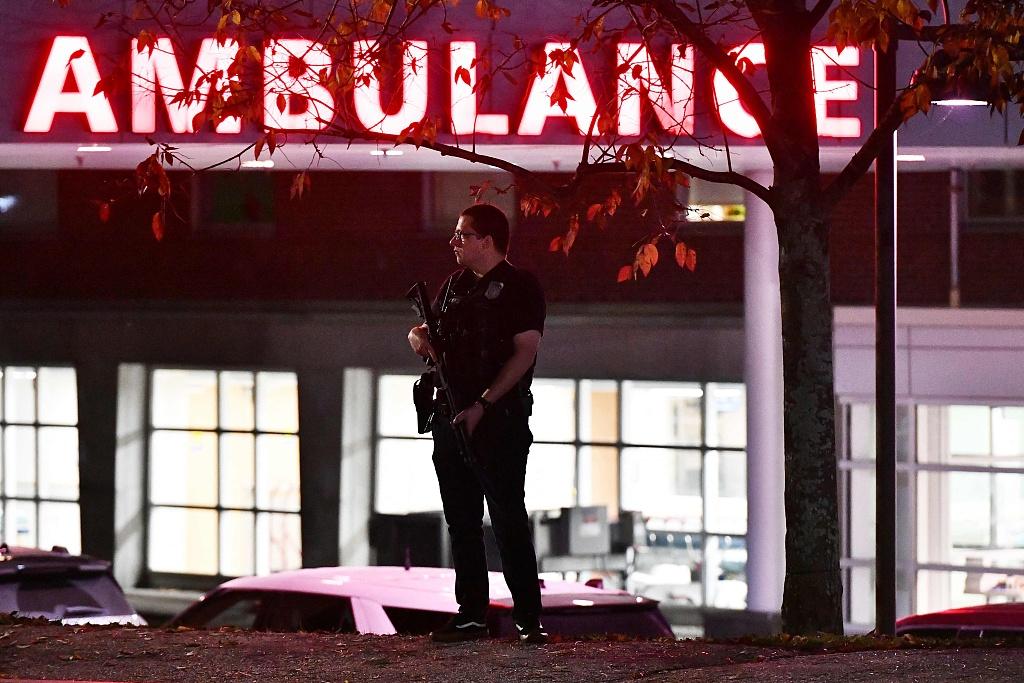The dangerous responsibilities of an American cop
- By Mitchell Blatt
 0 Comment(s)
0 Comment(s) Print
Print E-mail China.org.cn, November 21, 2023
E-mail China.org.cn, November 21, 2023

An armed police officer guards the ambulance entrance to the Central Maine Medical Center in Lewiston, Maine, on Oct. 26, 2023. [Photo/VCG]
In late October, one of the worst mass shootings in American history took place in Maine, the northeasternmost state in the U.S. Such terrible tragedies have become depressingly common, but even by American standards, this was brutal.
A 40-year-old army reservist drove to a bowling alley and began shooting indiscriminately during a youth bowling event. He killed seven people. Then 10 minutes later, he jumped into his car, drove 6.4 kilometers south, and murdered 11 more people at a bar and grill.
Local police responded within four minutes to the shooting at the bowling alley and within two minutes at the restaurant. It didn't matter. Semi-automatic rifles can fire 60-90 rounds of ammunition in a minute. By the time police or armed citizens are able to respond, the hot lead fired by the killer has already taken its toll.
The victims were women and men. They were old and young. Their ages ranged from 14 to 76. They were assaulted by lethal projectiles while eating dinner, going on dates, rolling strikes, and playing cornhole in a charitable tournament to support the deaf.
The murderer left the site of the second shooting before he was shot or apprehended and parked his car by a river, where he eventually killed himself. Now, some Americans are blaming the police for not doing a better job stopping him sooner.
There had been warnings that he was unstable. In May, the man's ex-wife and son reported to the local sheriff that he had been hearing voices. In July, Army Reserve leaders became aware of threats he had made during training exercises and reported him to law enforcement. The local sheriffs visited his trailer park home in September but retreated when he refused to answer the door. They never followed up.
The failure to stop the killer despite so many warning signs has instigated heavy scrutiny of the police. Why didn't they knock down his door in September? They had been warned that he was an expert marksman, and entering the home of a violent, paranoid killer would certainly have been dangerous. Why didn't they follow up with more backup later in September or October?
Certainly, the police response should be investigated – as should the responses of other political and firearm-related organizations. Why did American national and state law allow him to purchase firearms after the U.S. Army deemed him too dangerous to have access to military weapons? Why did his family not try to get him institutionalized?
The failure to stop this man before he spilled blood was the cause of many failures in American law and society. People whose mental health problems make them a threat to themselves and others circulate, oftentimes on their own, in society because of the combination of a lack of funding for mental health programs and restrictive laws that make it difficult to forcibly institutionalize those who need it.
Gun laws are so lax that almost anyone can purchase these tools of death. Background checks are not universally mandated, and those that are oftentimes rely on the honesty of the person filling out the questionnaire to determine if the prospective gun owner has any mental health problems. It is usually only after someone commits a serious crime – after it is too late, that is – that they are barred from purchasing weapons.
Juliette Kayyem, the faculty chair of the homeland security program at Harvard's Kennedy School of Government, wrote an essay for The Atlantic in which she argued, "The focus on law enforcement also shows how pessimistic many Americans have become about addressing the overarching problem: The United States has a plague of mass shootings committed by people with easy access to military-grade weapons."
There are other cases where the police were criticized for not barreling into the scene of flying bullets, risking their lives to stop active shooters. At the Parkland Shooting in 2018, one of the first officers on the scene, Scot Peterson, remained outside the school instead of entering to try to kill the shooter. He was tried for 11 counts related to negligence but found not guilty after his defense attorney argued that he had no bulletproof vest and no rifle upon arrival.
Our police officers are given power over Americans. With their power, their training, and their taxpayer-funded salaries, they have a responsibility to the American people. But how much do we expect of our police? Being a police officer in America is already a dangerous job, and it is made more dangerous by the widespread proliferation of guns that our politicians have done nothing to stop.
In 2021, 129 American law enforcement professionals were killed in the line of duty, and 73 were killed by criminals with guns. That was 29% higher than the year before.
But that's not the only reason Americans should be concerned about putting the entirety of the burden of stopping shooters on the police. It's also not effective. Whatever one thinks or hopes the police should do, we've seen time and time again that it is an imperfect response.
Mitchell Blatt is a columnist with China.org.cn. For more information please visit:
http://m.keyanhelp.cn/opinion/MitchellBlatt.htm
Opinion articles reflect the views of their authors, not necessarily those of China.org.cn.





